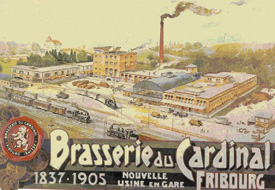Carlsberg to close Cardinal brewery in Fribourg
This move is part of the ongoing optimisation of the production network in the Carlsberg Group. For Carlsberg, Switzerland is just a tiny country in the heart of Europe. Why respect Swiss patriotism and maintain a network of costly production sites, if the beer volume can be split between two breweries less than a 90 minute drive apart – albeit in two different countries?
What Carlsberg plans to do is transfer the production of alcohol-free beer for export from the Feldschlösschen brewery (Switzerland) to the Kronenbourg brewery in Obernai (France). The Obernai brewery became part of the Carlsberg Group following the acquisition of Scottish & Newcastle (including Brasseries Kronenbourg) in 2008.That way, Feldschlösschen has the capacity to take on all the volume currently produced at the Cardinal brewery in Fribourg.
The Cardinal brewery has an annual capacity of 1 million hl, only 40 percent of which were used last year, while the Feldschlösschen brewery has 2 million hl.
If you crunch numbers for a living, the decision to close the Cardinal brewery will make sense.
But if you happen to be Wilhelm Tell reincarnate? It could mean that beer will be spilt in the streets of Fribourg.
In all fairness it needs to be said that Swiss brewers – before they were taken over by Carlsberg and Heineken – did not shy away from brewery closures either. In 1996, when Feldschlösschen first tried to shut down the Cardinal brewery by axing 200 of its 300 jobs, 10,000 Fribourg burghers took to the streets, 80,000 signed a petition and Feldschlösschen backed down.
A Carlsberg spokesman declined to give any estimate of the financial impact of the closure, but said that 75 affected employees in Fribourg will either be offered alternative employment within Feldschlösschen or will retire.
Feldschlösschen also has a microbrewery in Sion, with a capacity of 50,000 hl, which will be retained, Carlsberg said.
According to Swiss media estimates, Carlsberg has a market share of about 40 percent; Heineken (Calanda, Haldengut und Eichhof ) has perhaps 28 percent; imports account for 21 percent of consumption. The remainder is shared by Switzerland’s 300 odd microbreweries.
Beer consumption is less than 60 litres per capita, down from 70 litres at the beginning of the 1990s.


